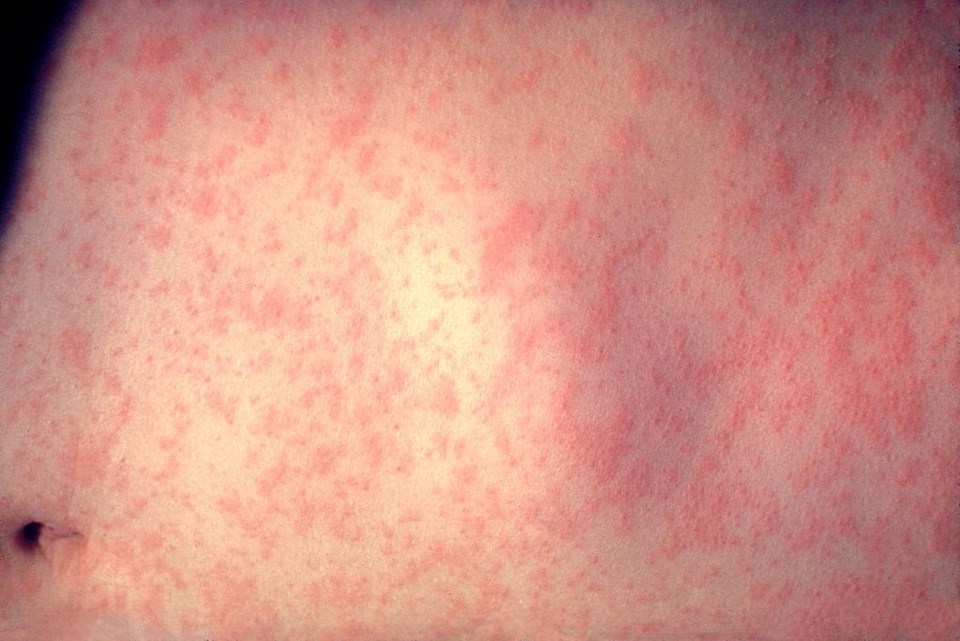By Alan Campbell
Vancouver Coastal Health (VCH) is urging people who may have been in contact with those connected to the measles outbreak to get vaccinated or boosted as soon as possible.
VCH gave the warning on the weekend after it emerged that eight cases of measles infections, which originated outside North America, have now been identified in Vancouver.
Last week an unrelated case of measles was also confirmed, bringing the total number of cases to nine this month.
One of the individuals visited the BC Children’s Hospital emergency department (ER) while they were infectious.
According to VCH, those who were at the emergency department on the dates and times below could have been exposed.
Most people in B.C. are immune to measles. However, if you were at the ER during these times and do develop symptoms of measles, contact your health care provider.
• Jan. 21 – 10 a.m. to 6:10 p.m.
• Jan. 23 – 4:45 p.m. to 11:10 p.m.
• Jan. 24 - 8:13 a.m. to 11:40 a.m.
• Feb. 1 - 2:05 p.m. to 6:55 p.m.
Meanwhile, a VCH chart shows that three Richmond schools have lower than the regional average of 83.1 per cent of student coverage for MMR vaccinations.
For Kindergarten age, at the end of the 2017/18 school year, most schools in Richmond were in the 90 to 100 per cent MMR coverage range.
Those below the VCH average were:
BC Muslim School, 12300 Blundell Road at 78.9 per cent;
Pacific Rim Montessori, which has two Steveston campuses, at 66.7 per cent;
Richmond Jewish Day School, near No. 5 and Blundell roads, at 54.5 per cent.
Each school year, VCH public health nurses collect immunization histories from schools, parents and primary care providers in order to provide history-based immunizations for kindergarten, grade 6 and grade 9 students.
According to VCH site, at the end of the school year, “immunization records are summarized to determine coverage levels by antigen, school, grade and health service areas.”
To see the full list for Richmond, go to https://tabsoft.co/2EkxeFL
Measles is a highly infectious disease that spreads through the air. Close contact is not needed for transmission.
The disease can also be spread through sharing food, drinks, cigarettes, or kissing an infected person.
Symptoms of measles include fever, cough, runny nose, and red eyes, followed a few days later by a rash that starts on the face and spreads to the chest.
Complications from measles can include pneumonia, inflammation of the brain (encephalitis), convulsions (seizures), deafness, brain damage, and death.
An infected person can spread measles before knowing they have been infected. People are infectious to others from four days before to four days after the onset of rash.
Since a number of cases have now been confirmed, there is an increased chance of unidentified exposures in the community.
Those who are unimmunized or incompletely immunized are at highest risk. Two doses of measles vaccine are 99 per cent effective at preventing measles.
Most cases now occur in those born after 1970 and who have had no doses or only one dose of measles vaccine.
People born before Jan. 1, 1970 and those who have had measles are likely immune.
Those born between 1970 and 1994, or grew up outside of B.C., may have had only one dose of measles vaccine and need a second dose to be fully protected.
Those born after 1970 who are not fully immunized with two doses of a measles vaccine, and who have not had measles disease in the past, should receive a dose of measles mumps, rubella (MMR) vaccine.
You can get the vaccine for free at your local community health centre, or the City Centre Urgent Primary Care Centre. Your family doctor and your pharmacist (for adults and kids over five) may also have the vaccine available.
If you develop the early symptoms of measles, call your doctor’s office first and tell them that you think you may have measles so they can book you in at a time that will ensure you don’t expose others.
This will allow your doctor to take precautions to protect other patients. Please also call Public Health at 604-675-3900 for advice and to report any illness.
As per British Columbia’s measles control guidelines individuals who are not immune to measles may not attend school until the period of transmission has passed.
For more information on measles, visit the VCH website at VCH.ca.



